Music Library Special Collections
Please explore our collections provided by various music donors. For more Information about each donor, follow the link below.
In addition, visit this page to see other large and special donations that remain in the process of becoming fully cataloged collections at the library:
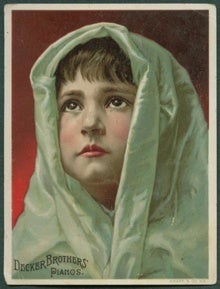
Alice Person: Good Medicine and Good Music
Professional musician, patent medicine entrepreneur, women’s rights advocate—all are appropriate titles for colorful North Carolinian Alice Person. This collection consists of digitized items from: (1) the Joyner Library Special Collection’s Alice Morgan Person Collection; (2) other university special collections; and (3) private collections.
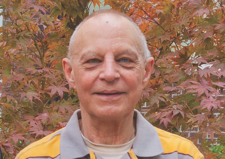 Conrad Sharpe Collection
Conrad Sharpe Collection
Consists of approximately 850 titles, mostly CDs, but also scores, books, and DVDs. The collection, with an emphasis on early music, was donated by area music lover Conrad Sharpe, who also donated the funds to create the Conrad Sharpe Music Library Endowed Fund, the music library’s first endowment.
This fund was established with a gift from the estate of Greenville music lover Conrad Sharpe. The proceeds from the fund may be used to supplement the music library budget in any number of ways. Examples of supplementary uses include, but are not limited to, purchasing library materials and equipment, and funding graduate assistantships for special projects.
View this collection in our catalog
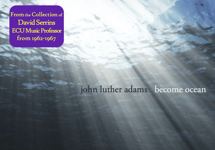 David Serrins Collection
David Serrins Collection
Consists of approximately 800 predominantly-orchestral CD titles containing multiple interpretations of the same work by different conductors and ensembles. The collection, with an emphasis on the works of Mozart and Mahler, was donated by Greenville residents Joan and Scott Respess, daughter and grandson of former ECU orchestra conductor David Serrins.
View this collection in the catalog
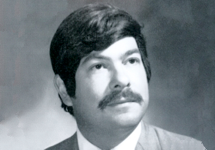 Gregory Kosteck Collection
Gregory Kosteck Collection
This collection consists of approximately 60 scores by composer Gregory Kosteck (1937-1991), as well as several audio recordings of his works and a small group of artifacts about his life. Many of the scores include handwritten markings and written correspondence from Kosteck himself.
Born in New Jersey, Gregory Kosteck attended the University of Maryland for his bachelor’s in music (1959) before going to the University of Michigan for his graduate studies. There, he received his M.Mus (1961) and D.M.A. (1964), and also met his future wife Nancy Kosteck (nee Bender) when both enrolled in a counterpoint class. Additionally, he shared his work with fellow composition student Gerald Cunningham, who ended up with a small group of Kosteck’s scores, which are now part of the Kosteck Collection.
According to a 1973 Greenville Daily Reflector article, Kosteck was “one of America’s most prolific and promising young composers.” As such, he quickly racked up a slew of awards and honors early in his life. His graduate work at Michigan was punctuated with a Fulbright Fellowship that allowed him to study for a year in Amsterdam. Shortly after receiving his doctorate, Kosteck was the recipient of a Ford Foundation Resident Artist Fellowship, which allowed him to work in Norwalk, Connecticut, composing pedagogical pieces for the Music Educators National Conference’s Contemporary Music Project. After a year at Washington and Jefferson College, Kosteck began teaching at East Carolina University in 1966. Here, he would become acquainted with ECU faculty members Barry Shank and Paul Topper. Barry Shank recognized Kosteck’s talent and collected as many of his scores as he could. Paul Topper premiered a number of Kosteck’s works. Shank’s large collection became the corpus of the Kosteck Collection, and Topper’s donation was added to that.
Kosteck’s compositional output at ECU continued to be prolific and well-acclaimed. The many honors awarded him during this time period include: (1) two silver medals at the International Prix Musical Concurs Reine Elizabeth de Belgique (1969), (2) top place at the Concours pour quatuor a cordes competition in Liege, Belgium (1972), and (3) a Pulitzer Prize nomination in the same year. Unfortunately, Kosteck’s personal life was plagued with problems that eventually affected his professional career. He left ECU in 1973, and the rest of that decade involved short teaching stints at Appalachian State University (1973-74), Columbia University (1974-76) and the University of Tennessee at Knoxville (1976-77).
By the late seventies, Kosteck had retired from academia, and spent the next decade in Knoxville working at East Tennessee Baptist Hospital in addition to his work as a freelance composer and teacher. During this period, he received awards from the following: (1) the Costa Rica International Festival of Orchestral Music (1978), (2) Poland’s Wieniawski International Composers’ Competition (1981), and (3) ASCAP (1982).
Kosteck retired to Sarasota, Florida in 1987. By this point in his life his compositional output had slowed dramatically, although he continued to write a handful of pieces into the late 1980s, receiving the Hamburg-Neustadt Prize in 1988. As early as 1978, he likely had already developed the illness that would eventually be known as AIDS, from which he died on December 27, 1991, at the age of 54.
Kosteck’s music was marked by a distinct lyrical melodicism that he integrated with the modernist aesthetic of the time, leading the New York Times to characterize him as “a carryover from the romantic era” and “more melodic than much of the serious contemporary music heard in concert halls today.” By his own admission, Kosteck relied on the American university system to cultivate and patronize modern classical music, calling the university “the last bastion of refuge for serious composers…where a composer can give vent to his creative ability under very favorable conditions.” His prolific and impressive output during his academic career gives credence to that statement.
Born in New Jersey, Gregory Kosteck attended the University of Maryland for his bachelor’s in music (1959) before going to the University of Michigan for his graduate studies. There, he received his M.Mus (1961) and D.M.A. (1964), and also met his future wife Nancy Kosteck (nee Bender) when both enrolled in a counterpoint class. Additionally, he shared his work with fellow composition student Gerald Cunningham, who ended up with a small group of Kosteck’s scores, which are now part of the Kosteck Collection.
According to a 1973 Greenville Daily Reflector article, Kosteck was “one of America’s most prolific and promising young composers.” As such, he quickly racked up a slew of awards and honors early in his life. His graduate work at Michigan was punctuated with a Fulbright Fellowship that allowed him to study for a year in Amsterdam. Shortly after receiving his doctorate, Kosteck was the recipient of a Ford Foundation Resident Artist Fellowship, which allowed him to work in Norwalk, Connecticut, composing pedagogical pieces for the Music Educators National Conference’s Contemporary Music Project. After a year at Washington and Jefferson College, Kosteck began teaching at East Carolina University in 1966. Here, he would become acquainted with ECU faculty members Barry Shank and Paul Topper. Barry Shank recognized Kosteck’s talent and collected as many of his scores as he could. Paul Topper premiered a number of Kosteck’s works. Shank’s large collection became the corpus of the Kosteck Collection, and Topper’s donation was added to that.
Kosteck’s compositional output at ECU continued to be prolific and well-acclaimed. The many honors awarded him during this time period include: (1) two silver medals at the International Prix Musical Concurs Reine Elizabeth de Belgique (1969), (2) top place at the Concours pour quatuor a cordes competition in Liege, Belgium (1972), and (3) a Pulitzer Prize nomination in the same year. Unfortunately, Kosteck’s personal life was plagued with problems that eventually affected his professional career. He left ECU in 1973, and the rest of that decade involved short teaching stints at Appalachian State University (1973-74), Columbia University (1974-76) and the University of Tennessee at Knoxville (1976-77).
By the late seventies, Kosteck had retired from academia, and spent the next decade in Knoxville working at East Tennessee Baptist Hospital in addition to his work as a freelance composer and teacher. During this period, he received awards from the following: (1) the Costa Rica International Festival of Orchestral Music (1978), (2) Poland’s Wieniawski International Composers’ Competition (1981), and (3) ASCAP (1982).
Kosteck retired to Sarasota, Florida in 1987. By this point in his life his compositional output had slowed dramatically, although he continued to write a handful of pieces into the late 1980s, receiving the Hamburg-Neustadt Prize in 1988. As early as 1978, he likely had already developed the illness that would eventually be known as AIDS, from which he died on December 27, 1991, at the age of 54.
Kosteck’s music was marked by a distinct lyrical melodicism that he integrated with the modernist aesthetic of the time, leading the New York Times to characterize him as “a carryover from the romantic era” and “more melodic than much of the serious contemporary music heard in concert halls today.” By his own admission, Kosteck relied on the American university system to cultivate and patronize modern classical music, calling the university “the last bastion of refuge for serious composers…where a composer can give vent to his creative ability under very favorable conditions.” His prolific and impressive output during his academic career gives credence to that statement.
View this collection in the catalog
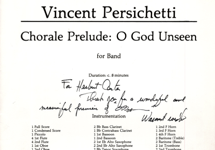 Papers concerning Chorale Prelude: O God Unseen for band by Vincent Persichetti 1982-1985
Papers concerning Chorale Prelude: O God Unseen for band by Vincent Persichetti 1982-1985
Papers relating to the commission and premiere of Chorale Prelude: O God Unseen for band by renowned twentieth-century American composer Vincent Persichetti. Consists of: (1) correspondence between composer Vincent Persichetti and Herbert L. Carter, conductor of the Wind Ensemble at the East Carolina University School of Music at the time of the commission; (2) newspaper clippings and programs; (3) Persichetti’s manuscript full score with performance markings; (4) published full score with inscription from Persichetti to Carter; and (5) published condensed score. The collection’s call number is Music Special Collections ML410 .P296 P3 1982 and it is only available for in-house viewing and study.
View this collection in the catalog
 Robert Hause Salon Orchestra Music Collection
Robert Hause Salon Orchestra Music Collection
An uncataloged collection of scores and parts for approximately 530 original and arranged works for salon orchestra, a genre originating in late-nineteenth-century Austria that featured small groups of players performing in intimate settings. The collection was previously owned by East Carolina University professor and orchestra conductor Robert Hause, who donated it to the Music Library when he retired. The collection was given to Hause by the family of K.W. Strom, and the materials bear the property stamp “Library of K.W. Strom”. It consists of the works of various composers, with emphasis on those of German and Scandinavian origin, published in the late-nineteenth and early-twentieth centuries.
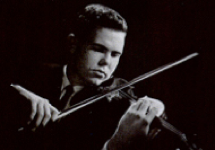 Thomas Moore Collection
Thomas Moore Collection
Consists of approximately 360 string-related books, scores, and CDs from the estate of North Carolina native, violinist, and pedagogue Thomas Moore given by his widow, past ECU nursing professor Sandra Walsh.
The ECU Music Library’s Thomas Moore Collection was a lifetime in the making in more ways than one. Not only is it the result of one man’s life-long love affair with the violin, it is the result of a rekindled love affair with a childhood sweetheart. Winston Salem, North Carolina, natives Thomas Moore and Sandra Walsh began their enduring romance in their middle school years with a little help from Sandra, who took up the viola in order to get into the school orchestra and closer to concert master Tom. The plan worked, and a short-lived young romance blossomed.
Fast forward through marriages and child rearing to the 1990s and an incidental mention of Sandra in a high school newsletter read by Tom in Miami, Florida. With a little research and a few mystery phone messages, Tom succeeded in rekindling his decades-old romance with Sandra, then a nursing professor at ECU.
Fast forward once again through 15 years of life together in sunny Miami to Tom’s cancer diagnosis and a call by Sandra to close friend and fellow ECU nursing professor Lou Everett in 2010. Lou and her husband, ECU administrator John Core, did what all good friends would do and investigated the possibility of leaving Tom’s legacy of string music-related books, scores, and CDs to ECU’s music library. Their inquiries were welcomed, and an agreement reached to preserve Tom’s musical legacy—an agreement that provided comfort during Tom’s final months. After three visits to Miami and countless hours of cataloging by music library staff members, the Thomas Moore Collection has come home to North Carolina, where it will continue Tom’s work of training young musicians for years to come.
The ECU Music Library’s Thomas Moore Collection was a lifetime in the making in more ways than one. Not only is it the result of one man’s life-long love affair with the violin, it is the result of a rekindled love affair with a childhood sweetheart. Winston Salem, North Carolina, natives Thomas Moore and Sandra Walsh began their enduring romance in their middle school years with a little help from Sandra, who took up the viola in order to get into the school orchestra and closer to concert master Tom. The plan worked, and a short-lived young romance blossomed.
Fast forward through marriages and child rearing to the 1990s and an incidental mention of Sandra in a high school newsletter read by Tom in Miami, Florida. With a little research and a few mystery phone messages, Tom succeeded in rekindling his decades-old romance with Sandra, then a nursing professor at ECU.
Fast forward once again through 15 years of life together in sunny Miami to Tom’s cancer diagnosis and a call by Sandra to close friend and fellow ECU nursing professor Lou Everett in 2010. Lou and her husband, ECU administrator John Core, did what all good friends would do and investigated the possibility of leaving Tom’s legacy of string music-related books, scores, and CDs to ECU’s music library. Their inquiries were welcomed, and an agreement reached to preserve Tom’s musical legacy—an agreement that provided comfort during Tom’s final months. After three visits to Miami and countless hours of cataloging by music library staff members, the Thomas Moore Collection has come home to North Carolina, where it will continue Tom’s work of training young musicians for years to come.
View this collection in the catalog
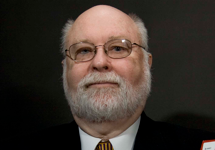 TomtheJazzman Collection
TomtheJazzman Collection
A large collection of jazz and popular music LPs and CDs with a strength in European outputs donated by former local NPR jazz show host Thomas Mallison.